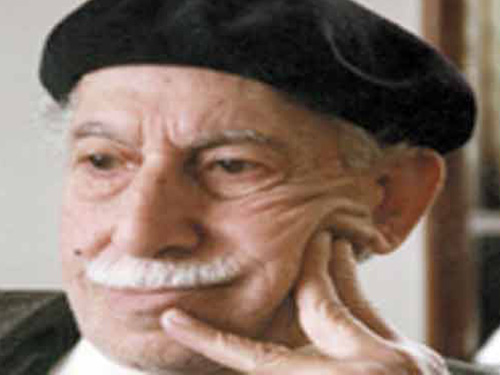Held on 18 and 19 April at El-Sawy Culture Wheel, the Monodrama Festival showcased a variety of one-man (or woman) plays staged by a gaggle of aspiring actors. Adila was awarded two first-prize trophies for best performance, as well as best director (Rimon Zaki). Bela Maana (Meaningless) won second place, and Bela Hawia (With no Identity) came in third.
Judging by the competing performances at El-Sawy Culturewheel’s 5th Monodrama Festival, there are certain rules one must adhere to when staging a monologue:
1. Begin your performance seated on a chair–your only prop–with your back to the audience. This allows you, the performer, to startle your audience into submission by spinning around in your seat and making an alarming announcement. Crazy eyes are optional.
2. At some point during your performance, make sure to spend some time crawling around on all fours, making obscure statements and/or crying.
3. Touch yourself as much as you can, as thoroughly as you can.
4. Spend at least two minutes convulsing to music that clashes wildly with any mood or atmosphere you might have so far established.
5. End your performance by abruptly running off stage. To maximize the effect, plan an escape route that will take you through the seated audience.
While one might expect the restrictions of a “Monodrama festival” to force some creativity out of its participants, the results were, for lack of a better word, monotonous.
“They’re all pretty much the same,” said Adham Bahgat, a young festival attendee. “And they’re all pretty depressing.”
A few of the themes examined by some of the festival’s monologues were “the concept of neglect and its tragic consequences,” and “the obstacles which man faces in his public, as well as private life,” according to the press booklet.
“I am waging a war against masks! No more masks, I say!” Gamal Ibrahim announced to the audience during his performance, titled “Excuse Me, Aristotle.” The young actor then proceeded to run, skip, and strut across the stage in a lengthy diatribe warning of the evils of “bad art.” Occasionally, the booming, disembodied voice of Aristotle interrupts Ibrahim’s monologue, offering an extract from the philosopher’s writings, to which the actor invariably replies: “Excuse me, Aristotle,” before resuming his prancing. Towards the end of his performance, Ibrahim, with a white shawl draped over his head, sprinted back and forth across the stage, flailing his arms and shouting, “I am a bat! Woo-ooo!”
Another typical performance was an act titled “Forbidden”, in which the audience was subjected to the rantings of a girl seemingly driven to insanity by the restrictions of our oppressive society. “What are you laughing at?” she repeatedly demanded of blank-faced audience members. “Laughing is forbidden!” A few minutes later, the disgruntled character–whose name, “Ahlam”, translates to “Dreams”–was swaying around to a sudden burst of 80’s rock music, in a four-minute long routine that combined elements of the Pulp Fiction dance sequence with amateur ballet. After crawling around and sobbing “Ahlam is DEAD!” the young actress ended her tour de force by wrapping herself in nylon ropes and screaming hysterically as offstage assistants tugged her back and forth.
The appropriately titled “Question Mark” was slightly less harrowing but just as incomprehensible, with actor Naglaa Younis portraying both a young girl, as well as an older, invisible-tea-drinking bureaucrat. Despite a linear first few minutes, events soon took several complicated turns, culminating in Younis’ character attempting to sell the audience either shoes and meat, or shoes made out of meat–it was difficult to tell by that point.
“I think some of the performances are good, and some are pretty terrible,” said Hamdy el-Qarawany, a 21-year-old member of the audience. Like the vast majority of the festival’s attendees, el-Qarawany has showed up to support a participating friend. “I’m leaving as soon as she’s done, though.”
Another attendee showing support for his friend expressed his disappointment to Al-Masry Al-Youm. “I didn’t know whether to laugh or cry,” said the young man who asked to remain anonymous.
May Mohamed agrees. Expressing anxiety at her friend’s upcoming performance, the 20-year-old Cairo University student states, “it’s a shame, because a lot of these actors are clearly talented, not to mention brave. It takes a lot to get up on stage alone like that. But even the few good performances are ruined by the material.”
“The problem is, a lot of these performances don’t really have anything to say,” points out 24-year-old Hatem Demerdash, an aspiring actor who is not participating in the festival. “Like that last monologue that we just watched,” he says of a performance entitled “An Egyptian Stance,” starring Asmaa Ahmed as a mother struggling to make decent meals out of the scraps her (invisible) husband brings home.




